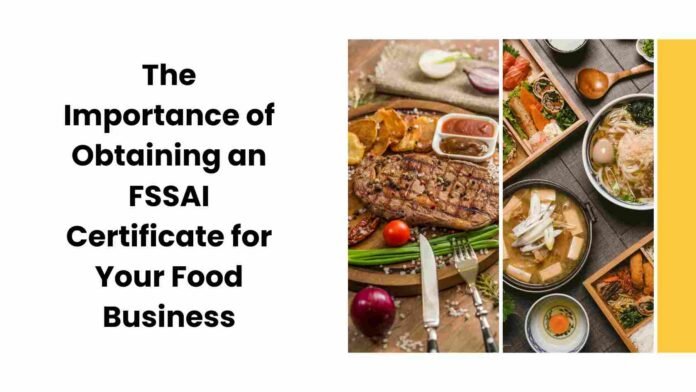Ensuring food safety is paramount for any food business, regardless of its scale or nature. In today’s world, where consumers are increasingly conscious about the quality and safety of the products they consume, obtaining an FSSAI (Food Safety and Standards Authority of India) certificate is not just a legal requirement but a mark of credibility and trustworthiness.
The FSSAI is the apex food regulatory body in India, established under the Food Safety and Standards Act, of 2006. Its primary objective is to regulate and oversee the safety and standards of food products to ensure they meet the prescribed quality benchmarks. Hence, obtaining an FSSAI Certificate is essential for any food business to demonstrate compliance with these standards.
Why is it important?
Legal Compliance:
Operating without an FSSAI certificate is illegal and can result in hefty fines, closure of the business, or even imprisonment. Compliance with FSSAI regulations is mandatory for all food businesses, including manufacturers, distributors, retailers, and even food importers.
Consumer Trust:
Displaying an FSSAI certificate instills confidence in consumers about the safety and quality of your products. In an era where food scandals and adulteration are prevalent, consumers actively seek assurances that the food they consume adheres to safety standards. Holding an FSSAI certificate serves as tangible proof of your commitment to food safety.
Market Access:
Many retail chains, supermarkets, and online platforms mandate FSSAI certification for listing products on their platforms. Without this certification, your business may miss out on lucrative distribution channels and opportunities for expansion.
Brand Reputation:
Building a strong brand reputation is vital for long-term success in the food industry. FSSAI certification adds credibility to your brand, distinguishing it from competitors who may not have obtained the certification. This, in turn, can lead to increased customer loyalty and positive word-of-mouth publicity.
Risk Mitigation:
Compliance with FSSAI standards helps mitigate the risk of foodborne illnesses, contamination, and product recalls. By implementing stringent quality control measures and adhering to regulatory requirements, you can minimize the likelihood of incidents that could harm consumers and damage your brand’s reputation.
Access to Government Schemes:
Some government schemes and initiatives aimed at supporting food businesses, such as subsidies, preferential loans, or participation in food fairs and exhibitions, may require FSSAI certification as a prerequisite. Holding this certification opens doors to such opportunities, allowing your business to benefit from government support and incentives.
International Trade Opportunities:
If your food business has aspirations for global expansion or even just exporting products to other countries, FSSAI certification is often a mandatory requirement. Many countries have stringent food safety regulations, and holding an FSSAI certificate demonstrates that your products meet internationally recognized standards, facilitating smoother entry into foreign markets.
Employee Training and Awareness:
Obtaining FSSAI certification necessitates knowledge and understanding of food safety practices and regulations. This often translates into comprehensive employee training programs and heightened awareness among your staff about the importance of food safety. Well-trained employees are better equipped to handle food safely, reducing the risk of contamination or mishandling.
Competitive Advantage:
In a crowded marketplace, where consumers are bombarded with numerous choices, having an FSSAI certificate can give your business a competitive edge. It sets you apart as a responsible and trustworthy player in the industry, potentially attracting more customers and fostering loyalty. Moreover, it may serve as a barrier to entry for competitors who are unwilling or unable to invest in meeting regulatory standards.
Continuous Improvement:
The process of obtaining and maintaining FSSAI certification encourages continuous improvement within your food business. It involves regular audits, inspections, and compliance checks, which provide valuable feedback on areas for enhancement. By continually striving to meet and exceed food safety standards, your business can stay ahead of evolving regulations and consumer expectations, ensuring long-term viability and success.
Conclusion:
In conclusion, obtaining an FSSAI certificate is not just a regulatory obligation but a strategic imperative for any food business. It serves as a badge of honor, signaling your commitment to producing safe and high-quality food products. By prioritizing food safety through FSSAI certification, you not only comply with legal requirements but also build consumer trust, enhance market access, and safeguard your brand reputation. In today’s competitive food industry landscape, investing in FSSAI certification is an investment in the future success and sustainability of your business.





